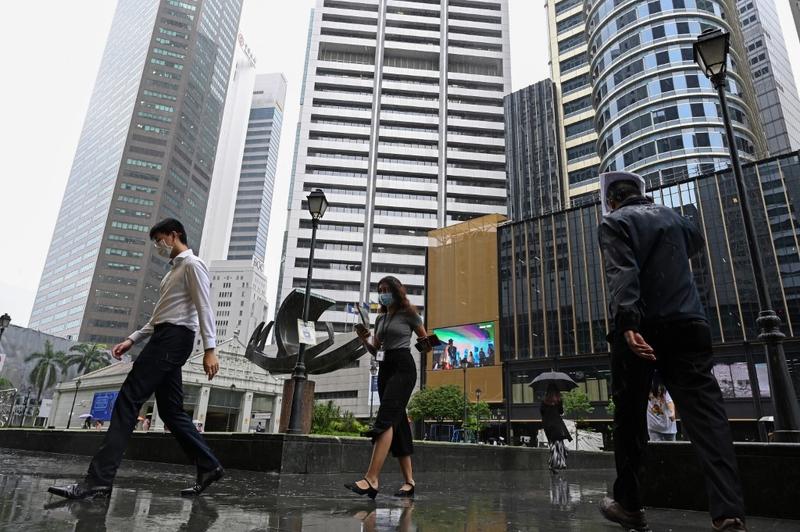 Office workers walk around the central business district in Singapore on Nov 23, 2020. (ROSLAN RAHMAN / AFP)
Office workers walk around the central business district in Singapore on Nov 23, 2020. (ROSLAN RAHMAN / AFP)
SINGAPORE - Asian firms turned most optimistic in the fourth quarter this year, a Thomson Reuters/INSEAD survey showed, as business activity picked up in the region and COVID-19 vaccines started rolling out in Western countries ahead of their Asian launch.
The outlook for Asian companies in the next six months tracked by the Thomson Reuters/INSEAD Asian Business Sentiment Index jumped to 62 this quarter from 53 in the third quarter.
The latest number according to the survey of 101 firms across 11 Asia-Pacific countries was the highest since the fourth quarter of 2019. A reading above 50 indicates a positivec outlook.
Things are getting better but they are getting better with still a dose of uncertainty. The effect of the crisis is very different across sectors.
Antonio Fatas, Economics professor at INSEAD
“There’s a sense of optimism going forward,” said Antonio Fatas, Singapore-based economics professor at global business school INSEAD.
ALSO READ: RCEP 'a driving force for global economy' in post-virus era
“Things are getting better but they are getting better with still a dose of uncertainty. The effect of the crisis is very different across sectors,” he added, noting the weakness in the transport sector due to curbs on global travel.
Still, more than half the respondents polled flagged persistent cases of the novel coronavirus as well as the possible scarcity of vaccines in parts of the world - at least initially - as their biggest risk.
While the United States and Britain have already started vaccinating their populations, few Asian countries expect to get significant amounts of coronavirus vaccines in coming weeks.
Some Asian countries are still running their own late-stage trials of vaccines, while others are allowing time to check for any side effects in people inoculated elsewhere.
READ MORE: Fresh virus wave testing South Korea's no-lockdown strategy
A quarter of the companies in the survey, which was conducted between Dec 4-18, were most concerned about businesses cutting jobs, which would hurt consumption.
Yet others flagged as their top risks a withdrawal of stimulus by central banks, and newly elected United States President Joe Biden keeping a tough line on China.
The coronavirus pandemic has brought on the worst global economic slowdown since the Great Depression, with millions of jobs lost and industries brought to their knees.
Still, Asia, which has had greater success in controlling the virus than Europe and the United States, is leading hopes of an economic recovery.
Year of the phoenix
“After a year marked by economic contraction, 2021 stands to be the ‘year of the phoenix’, with a strong rebound in global gross domestic product and corporate earnings in 2021 thanks to the unrolling of vaccines and substantial policy support,” said Cesar Perez Ruiz, chief investment officer at Pictet Wealth Management.
A recovery to pre-pandemic levels in China, the world’s second-largest economy, has fuelled revival hopes
A recovery to pre-pandemic levels in China, the world’s second-largest economy, has fuelled revival hopes. Equity markets in the Chinese mainland, South Korea and Taiwan are up at least 20 percent this year, leading the region’s gains.
ALSO READ: Innovation to drive Asia recovery
According to the Thomson Reuters INSEAD survey, some 44 percent of the companies polled in the fourth quarter were positive about their outlook for the next six months, up sharply from 28 percent in the third quarter and nearly 8 percent in the second.
About 58 percent of the firms said they did not hire or lay off people this quarter, and a fifth said staffing levels were lower. This was similar to numbers in the third quarter. In the second quarter, 62 percent of the companies said they had cut jobs.
“While I still see some uncertainty, the numbers are good,” said Fatas. “It looks like a recovery that is taking speed and where more businesses feel confident.”
Companies polled included India’s Housing Development Finance Corp Ltd, Japanese car maker Suzuki Motor Corp, and Thai electronics company Delta Electronics (Thailand) PCL.


